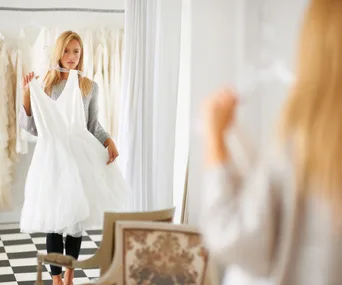When I was 28 I tried to squeeze myself into a pair of skinny jeans. They were all the rage and I wanted in on the trend. But being voluptuous and vertically challenged (short and fat) it was never going to happen. I couldn’t even get the wretched denim over my thighs.
It wasn’t my finest moment, but at least I got to experience it alone in the privacy of a tiny changing room. I didn’t escape my reflection though – face flushed and body contorted – it wasn’t a pretty sight.
We’ve all been there. In fact, a recent survey from the UK found that more than half of women feel ‘down’ after seeing themselves in a changing room mirror.
In response to this research, Hammerson, one of the UK’s leading retailers has decided to remove the mirrors from four of its shopping malls. They hope that this will help to boost the confidence of female shoppers and create a more pleasant shopping experience.
Alex Thomas is the regional marketing manager for Hammerson. He told the Telegraph that he hopes the scheme will make women trying on clothes feel “comfortable and confident.”

“We hope that women in particular will try something on and feel gorgeous and glamorous. Hopefully this will be a success and we can roll it out across our shopping centres for the summer,” he said.
According to the research, rather than facing their own reflection many women prefer to trust the opinion of a friend or shop assistant (because they will always tell you the truth about how you look?)
I can see that Hammerson’s heart is in the right place (although a more cynical person might wonder if this ridiculous plan will result in a sales boost.) However, if fashion retails really want to improve women’s self esteem a better bet might be to actually address the source of the body image crisis.
I asked psychologist Mandy Edkins where she thinks our body image issues come from. She tells me that it is a complex subject.
“Female body image issues often result in a comparison between ourselves and what we believe to be ‘the norm’.
“If what we see in the mirror compares favourably with the images we are taking as our standard then we’re happy; if not then many women may quickly assume that their body is ‘wrong’,” Edkins explains.

Edkins notes that the images we perceive as ‘normal’ come from mainstream TV, movies, music videos, celebrities and retail advertisements that appear in clothes shops.
“The problem with this is that it is a body shape and size that has been created entirely for the medium of advertising or marketing. It is very unusual and, often very unhealthy and difficult to maintain,” she says.
And yet, because we are constantly exposed to these images we aspire to the ‘ideal’ and stop looking at the women we are surrounded by in the real world.
Edkins says that this is particularly dangerous for teenagers and young women because they are at a stage where the need to ‘fit in’ and be accepted is overwhelming.
However, poor body image isn’t a problem that is limited to teenagers and young women – as the Hammerson mirror survey demonstrates.
So will removing mirrors help to combat the issue? Edkins doesn’t think so. She tells me that mirrors are less to blame than the perceived expectation of what we should look like.
If retailers are serious about turning the tide of poor body image then a better approach might be to use a broader range of body shapes in their advertising.
Edkins agrees that it would be a good place to start. “Normalising difference in body types is important to build women’s confidence and self-esteem,” she says.
“It’s important that women see styles on different sized models before they try clothes on, so that they don’t receive that unpleasant shock feeling when their reflection in the changing room mirror does not resemble the airbrushed image in the advertising material,” Edkins explains.
Taking the mirrors away wont improve poor body image, it will just keep it at bay. Nobody can avoid their reflection indefinitely.



